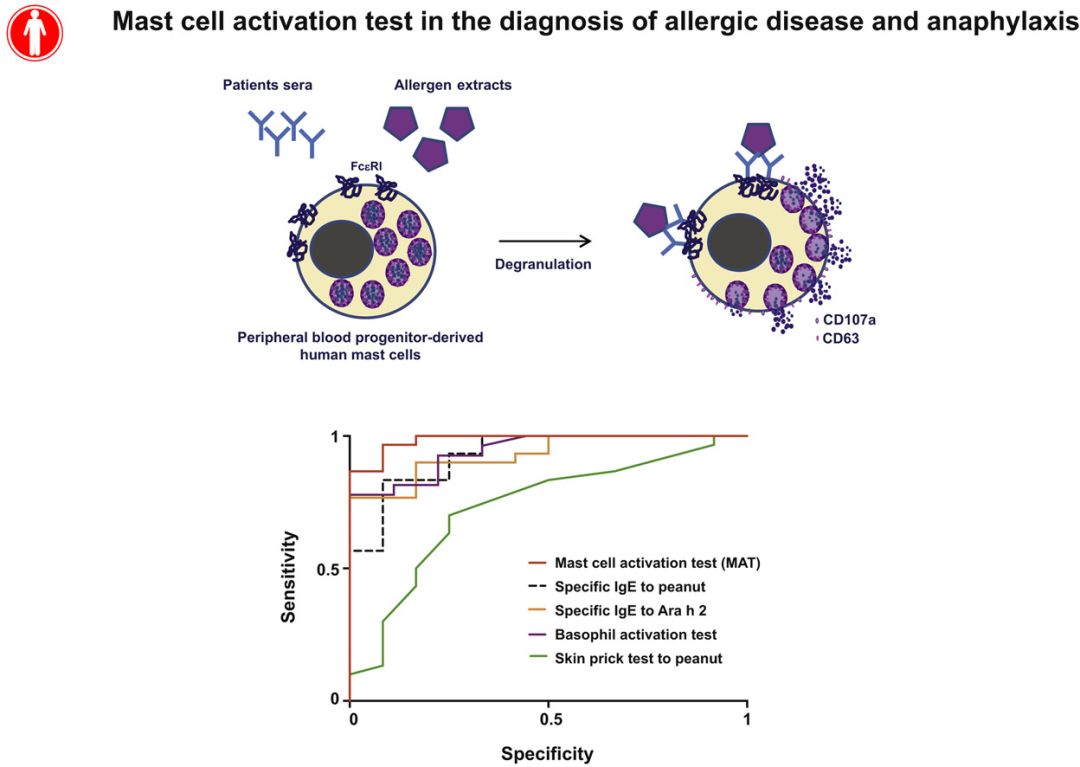Release date:2019-04-15

JACI [IF:13.1]
DOI: https://doi.org/10.1016/j.jaci.2018.01.043
Background
Food allergy is an increasing public health issue and the most common cause of life-threatening anaphylactic reactions. Conventional allergy tests assess for the presence of allergen-specific IgE, significantly overestimating the rate of true clinical allergy and resulting in overdiagnosis and adverse effect on health-related quality of life.
Objective
To undertake initial validation and assessment of a novel diagnostic tool, we used the mast cell activation test (MAT).
Methods
Primary human blood-derived mast cells (MCs) were generated from peripheral blood precursors, sensitized with patients' sera, and then incubated with allergen. MC degranulation was assessed by means of flow cytometry and mediator release. We compared the diagnostic performance of MATs with that of existing diagnostic tools to assess in a cohort of peanut-sensitized subjects undergoing double-blind, placebo-controlled challenge.
Results
Human blood-derived MCs sensitized with sera from patients with peanut, grass pollen, and Hymenoptera (wasp venom) allergy demonstrated allergen-specific and dose-dependent degranulation, as determined based on both expression of surface activation markers (CD63 and CD107a) and functional assays (prostaglandin D2 and β-hexosaminidase release). In this cohort of peanut-sensitized subjects, the MAT was found to have superior discrimination performance compared with other testing modalities, including component-resolved diagnostics and basophil activation tests. Using functional principle component analysis, we identified 5 clusters or patterns of reactivity in the resulting dose-response curves, which at preliminary analysis corresponded to the reaction phenotypes seen at challenge.
Conclusion
The MAT is a robust tool that can confer superior diagnostic performance compared with existing allergy diagnostics and might be useful to explore differences in effector cell function between basophils and MCs during allergic reactions.
All Authors:
Rajia Bahri Adnan Custovic Peter Korose Marina Tsoumani Martin Barron Jiakai Wu Rebekah Sayers Alf Weimann , Monica Ruiz-Garcia Nandinee Patel Abigail Robb Mohamed H. Shamji
Sara Fontanella Sara Fontanella Mira Silar E.N.Clare Mills Angela Simpson Paul J. Turner Paul J. Turner
2019-4-7 Artical
MK手机投注 | 安博·体育(中国)有限公司-官网 | 乐动官方网站 | 星空手机版 | 星空手机版 | mk体育(MKsports集团)股份公司 | 安博手机网页版登录入口 | 华体平台 | 千亿体育官网在线登录入口中国有限公司 |
 华亿体育(中国)游戏平台
华亿体育(中国)游戏平台
